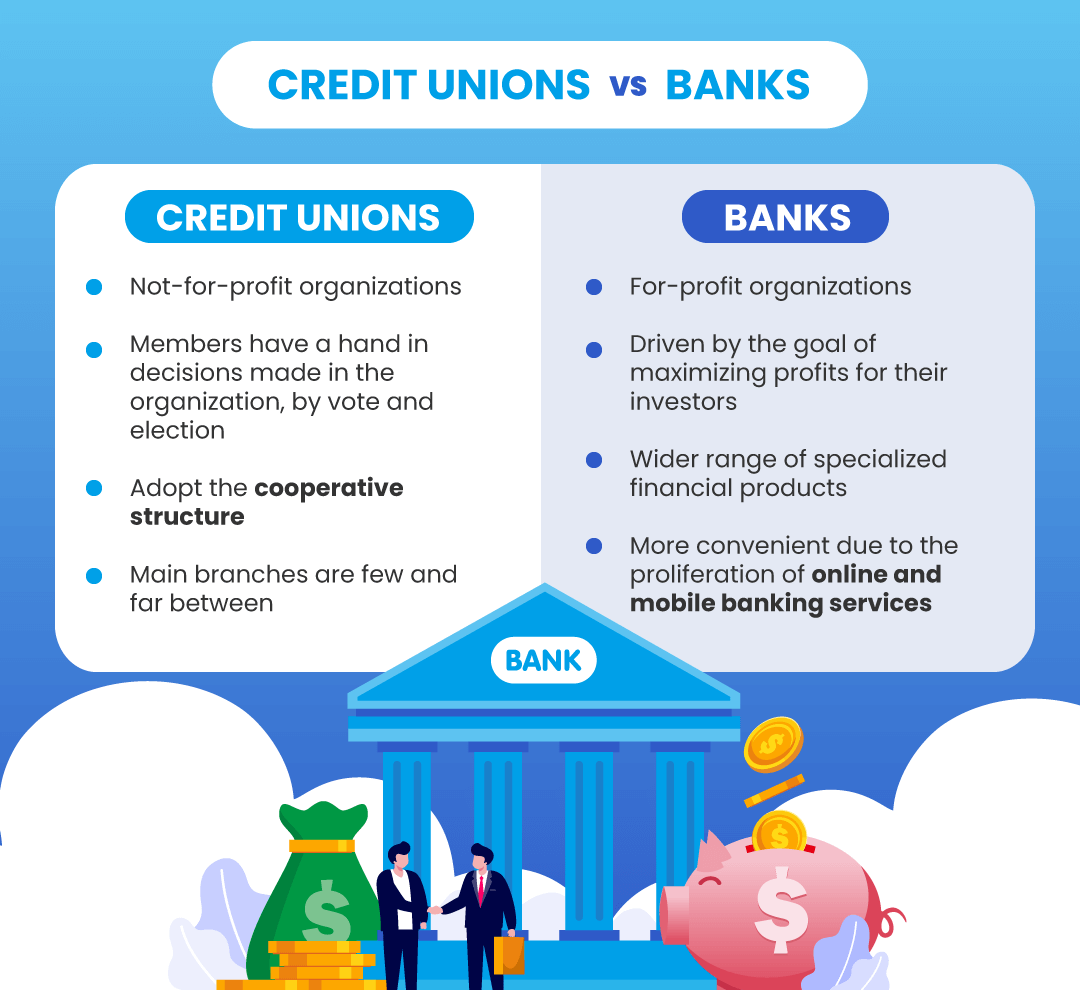Hybrid Line of Credit: Flexible Financing Options from Your Wyoming Credit Union
Hybrid Line of Credit: Flexible Financing Options from Your Wyoming Credit Union
Blog Article
The Ultimate Overview to Comprehending Credit Score Unions

Lending institution stand as distinct financial entities, rooted in principles of mutual assistance and member-driven procedures. Nonetheless, beyond their fundamental worths, recognizing the elaborate workings of lending institution involves a much deeper exploration. Unwinding the complexities of membership qualification, the development of solutions offered, and the distinct benefits they bring needs a detailed assessment. As we browse with the ins and outs of credit unions, an informative trip waits for to drop light on these member-focused institutions and exactly how they differ from traditional banks.
What Are Lending Institution?
Lending institution are member-owned financial institutions that supply a variety of financial solutions to their participants. Unlike conventional banks, debt unions operate as not-for-profit companies, suggesting their main focus gets on offering their participants as opposed to making the most of revenues. Members of a credit score union typically share an usual bond, such as working for the exact same employer, coming from the very same neighborhood, or being component of the same company.
One of the key benefits of lending institution is that they usually offer higher rates of interest on interest-bearing accounts and lower rate of interest on car loans contrasted to banks. Federal Credit Union. This is because credit rating unions are structured to profit their members directly, allowing them to pass on their profits in the form of far better prices and fewer fees. Furthermore, lending institution are known for their customized client solution, as they focus on developing connections with their participants to understand their unique monetary demands and goals
History and Advancement of Cooperative Credit Union
The roots of member-owned financial cooperatives, understood today as cooperative credit union, trace back to a time when communities looked for choices to typical banking institutions. The principle of lending institution originated in the 19th century in Europe, with Friedrich Wilhelm Raiffeisen usually credited as the pioneer of the cooperative banking motion. Raiffeisen started the very first identified lending institution in Germany in the mid-1800s, highlighting area assistance and self-help concepts.
The evolution of lending institution proceeded in The United States and Canada, where Alphonse Desjardins developed the initial credit report union in Canada in 1900. Soon after, in 1909, the first united state credit scores union was created in New Hampshire by a group of Franco-American immigrants. These early cooperative credit union operated the essential concepts of common help, democratic control, and member ownership.
In time, credit score unions have grown in appeal worldwide because of their not-for-profit framework, concentrate on serving participants, and offering affordable financial products and services. Today, credit unions play an important function in the monetary industry, supplying easily accessible and community-oriented banking options for individuals and companies alike.

Membership and Qualification Criteria
Subscription at a lending institution is typically limited to people meeting details eligibility criteria based upon the establishment's founding concepts and governing demands. These criteria commonly consist of elements such as geographical location, employment standing, membership in specific companies, or affiliation with certain groups. Credit history unions are recognized for their community-oriented strategy, which is mirrored in this content their membership requirements. Wyoming Credit Union. For example, some cooperative credit union may only offer individuals that work or live in a certain location, while others may be tailored to staff members of a specific business or participants of a specific association.
Furthermore, cooperative credit union are structured as not-for-profit organizations, meaning that their main goal is to offer their participants rather than produce profits for investors. This concentrate on participant solution typically converts right into more personalized attention, lower charges, and competitive interest prices on loans and savings accounts. By fulfilling the qualification standards and coming to be a member of a cooperative credit union, people can access a variety of monetary services and products tailored to their particular requirements.
Solutions and Products Supplied
One of the key facets that establishes credit rating unions apart is the varied range of financial services and items they offer to their members. Credit history unions usually supply standard financial services such as cost savings and examining accounts, fundings, and charge card. Participants can additionally take advantage of investment services, including pension and monetary preparation help. Several credit history unions offer affordable rate of interest on financial see post savings accounts and finances, in addition to lower costs compared to standard banks.
Additionally, cooperative credit union usually give practical online and mobile banking alternatives for members to quickly manage their finances. They may supply advantages such as common branching, allowing participants to access their accounts at other credit scores unions throughout the country. Some lending institution likewise offer insurance coverage items like life, home, and auto insurance to aid members secure their properties and liked ones.

Advantages of Banking With Lending Institution
When taking into consideration monetary institutions, discovering the advantages of financial with cooperative credit union reveals one-of-a-kind benefits for participants looking for individualized solution and competitive prices. One significant advantage of cooperative credit union is their concentrate on customized consumer service. Unlike big financial institutions, cooperative credit union are member-owned and focus on building strong partnerships with their members. This indicates that credit rating union personnel often have a deeper understanding of their members' economic needs and can use customized solutions to assist them attain their goals. Furthermore, lending institution are understood for supplying competitive rate of interest prices on cost savings and financings accounts. Because they are not-for-profit organizations, lending institution can frequently offer reduced lending rates, greater financial savings prices, and reduced costs contrasted to conventional banks. This can lead to substantial price financial savings for participants over time. Generally, financial with a credit score union can offer a much more tailored, economical, and member-centric economic experience.
Final Thought
Finally, credit history unions attract attention as member-owned banks that focus on serving their members over optimizing revenues. With origins dating back to 19th century Europe, credit report unions follow principles of shared assistance and participant possession. They provide a variety of financial product and services, consisting of standard banking solutions, financial investment options, and competitive interest rates. Subscription qualification requirements are details and show a community-oriented approach, offering individualized customer care and a member-centric monetary experience.
Credit rating unions are member-owned financial establishments that offer an array of financial services to their members. The concept of credit score unions stem in the 19th century in Europe, with Friedrich Wilhelm Raiffeisen usually attributed as the leader of the cooperative financial activity.The evolution of credit score unions proceeded in North America, where Alphonse Desjardins developed the first credit report union in Canada in 1900. Credit score unions generally offer conventional financial services such as financial savings and inspecting accounts, finances, and debt cards.When taking into consideration monetary institutions, checking out the advantages of financial with discover this info here credit rating unions reveals distinct benefits for participants seeking individualized service and affordable rates.
Report this page